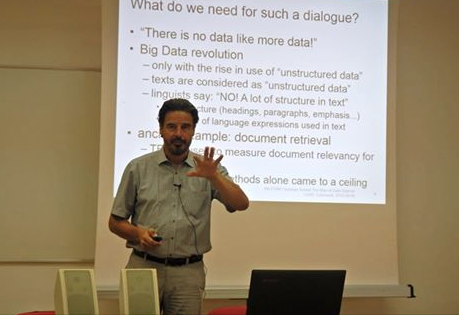Between Monday 5th and Saturday 10th of September, the European Data Science Academy supported the 6th ESWC Summer School 2016 focused on providing intensive training and networking opportunities for the next-generation of scientists and researchers in the digital age. The summer school was located in Dubrovnik, Croatia and was dedicated on providing intensive workshops, talks, and practical sessions to combat the rise in data science across Europe.
In particular the ESWC Summer School wishes to facilitate the creation of a new cohort of Master, PhD students, and junior researchers, who will in time become the next leaders of the Data Science and Semantic Web communities. The topics of the summer school are aligned with the most prominent and emerging topics and the broader area of knowledge and data technologies that spans across a number of research areas, from knowledge representation and Linked Data to machine learning and big data.
Keynotes were professed by Ricardo Baeza-Yates (CTO of NTENT), Prof Stefan Decker (Director of the Fraunhofer Institute for Applied Information Technology), Rayid Ghani (Director of the Center for Data Science and Public Policy), and Prof Marko Tadic (Professor of Linguistics at University of Zagreb) on a variety of data-related topics spanning semantic technologies, linked data and data science.
A number of EDSA learning materials were made available to the attendees of the summer school, in order to provide the attendees with knowledge and background on the various topics taught during the course of the summer school. EDSA partners, Prof Elena Simperl, Prof John Domingue and Dr. Chris Phethean taught on various aspects of data science learned from the EDSA project, providing key skills and knowledge in the vastly-expanding world of data science in the EU.
The full programme can be found at http://summerschool2016.eswc-conferences.org/about/programme/ and applications for next years ESWC summer school will likely be open as of March 2017. The summer school is open to anyone studying in a computing-related post-graduate course or is at an early stage of a relevant career in industry or academia. Places are generally limited to 50 in order to ensure that all participating students receive quality time with their tutors.
The videolecture presented by Prof Elena Simperl, can be found at http://summerschool2016.eswc-conferences.org/.


